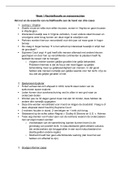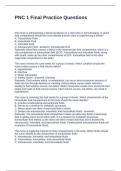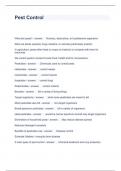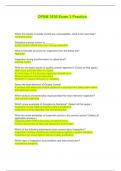Chapter 1: practical theory
Improvised activities =
Not according to a laid down plan + usually when something unforeseen occurs that requires an
immediate response.
Hard to predict the outcomes
Flexible, but often chaotic (ad hoc)
Routine activities =
Activities that are repeated frequently and are relatively predictable. Work will be carried out
according to patterns
Production line activities, sales procedures
Project-based activities =
Between improvised and routine activities. Have a limited duration and are predictable.
Work divided in phases
First project plan
Information technology
Project =
A group of people, usually from various fields of expertise, collaborating temporarily with the aim of
reaching a predetermined project result within a predetermined budget and timeframe.
Constructing projects (building bridge/factory)
Developing new product
Introducing learning environment at schools
Organizing a festival
Project features
Temporary (clear starting point, finishing date)
Unique and clearly defined goal
Has a clearly defined result
Project sponsor (paying the project)
Project organization (project manager & team)
Project members different expertise
What is the result
Type of projects
1. Technical projects (or hard projects)
- Change in technology or develop new product
Construction of a building, a road
2. Social projects (or soft projects)
- Change organizational structure or culture of company (how people work together)
Reorganization
3. Commercial projects
- Goal is to earn money
Conducting market research, new product
4. Mixed projects
- Both technical and social projects
, - Difficult because team has wide variety expertise
Design, programming and installation of a computer program
Top project failure reasons
1. Poor planning
2. Too optimistic planning
3. Failure to track progress
4. Starting an activity too late
5. Project members are not competent enough
6. Little delays all add up
Phases of a small project:
1. Preparation (think)
2. Realization (act)
3. Follow-up (maintain)
Phases of a large project:
1. Concept the idea, project proposal
2. Definition define result, project plan
3. Design decide result, design report
4. Preparation detailing how, building plan
5. Realization doing it, project result
6. Follow-up provide follow-up, resolving problems
In phases because then the client can adjust in the project
Project should be SMART
Specific: project result described in detail
Measurable: result must be measurable
Acceptable: group/person must be responsible for achieving the result
Realistic: result must be realistic
Time-bound: deadline
Chapter 2: people working on projects
Marshmallow challenge:
- Teams of 4
- Forces people to collaborate quickly
- Normally first orienting (talk)
- Planning
- Building
- Ta-da
The ‘Ta-da’ is a ‘oh-oh’: fail
None of the kids spend any time to talk.
- Business students are trained to find the plan
- When it happens, they run out of time.
They manage the process
- Any team who does that, improve the team performance
Why conduct the marshmallow challenge:
- It helps the hidden assumptions
- The challenge is the shared experience











